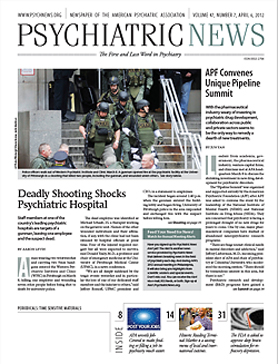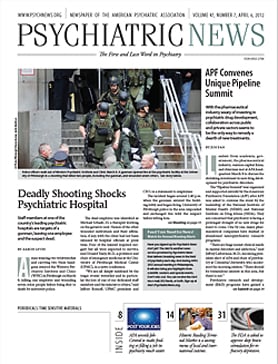When seniors experience memory loss, how can you tell whether they have mild cognitive impairment (MCI) or early Alzheimer’s disease?
A few months ago, leading Alzheimer’s experts, under the aegis of the National Institute on Aging and the Alzheimer’s Association, published guidelines that they hoped would help clinicians answer this question (Psychiatric News, June 3, 2011).
These guidelines, however, compromise the distinction between MCI and early Alzheimer’s, charges an Alzheimer’s scientist who was not involved in the guideline development—John Morris, M.D., director of the Alzheimer’s Disease Research Center at Washington University. He made his case in the Archives of Neurology in February.
Morris based his objections on a study that he conducted. It included some 18,000 patients from 33 federally funded Alzheimer’s Disease Centers who had already been diagnosed, before the new guidelines were in place, as having normal cognition, MCI, or Alzheimer’s. Morris then evaluated these subjects according to the new guidelines.
He found that most of those who had been diagnosed with mild Alzheimer’s would be considered under the new guidelines to have MCI instead, based on their level of impairment on the Clinical Dementia Rating domains for performance of instrumental activities of daily living in the community and at home.
In other words, the major point of contention has to do with the ability to perform everyday activities such as shop, prepare a meal, handle finances, or drive, Morris explained. It used to be thought that if an individual had even mild difficulties with such activities, then he or she was considered to be in the early stage of Alzheimer’s. Under the new guidelines, individuals experiencing such difficulties could be reclassified as having MCI rather than early Alzheimer’s, he said, and as a result, “the categorical distinction between MCI and milder stages of Alzheimer’s has been compromised by the revised criteria.”
Furthermore, “the elimination of the functional boundary between MCI and Alzheimer’s,” Morris asserted, “means that their distinction will be based solely on the individual judgment of clinicians, resulting in nonstandard and ultimately arbitrary diagnostic approaches to MCI.”
And such arbitrary approaches, he suggested, could have negative repercussions, such as confounding clinical trials involving individuals with MCI where progression to Alzheimer’s is an outcome.
What do the Alzheimer’s experts who helped draw up the new guidelines have to say about Morris’s charges?
“I do not think the new guidelines compromise the distinction between mild cognitive impairment and Alzheimer’s,” Ronald Petersen, M.D., Ph.D., director of the Alzheimer’s Disease Research Center at the Mayo Clinic, told Psychiatric News. “[Morris] ignores the fact that the criteria for MCI explicitly preclude the diagnosis of dementia. Therefore his analysis of the data is fallacious since he just looked at the Clinical Dementia Rating and disregarded the other criteria for MCI. [Also] the Clinical Dementia Rating … was constructed in the 1970s to discriminate between Alzheimer’s and normal, long before the construct of MCI was developed.”
“I think the distinction between MCI and very mild Alzheimer’s is quite tricky,” Reisa Sperling, M.D., an associate professor of neurology at Harvard Medical School, told Psychiatric News. “But I actually agree with Dr. Morris on the preclinical categorization [of Alzheimer’s], which is the [purview of] the work group that I led. He argues that there should be only two categories—preclinical (presymptomatic) and symptomatic.”
The study was funded by the National Institute on Aging and the National Alzheimer’s Coordinating Center.


